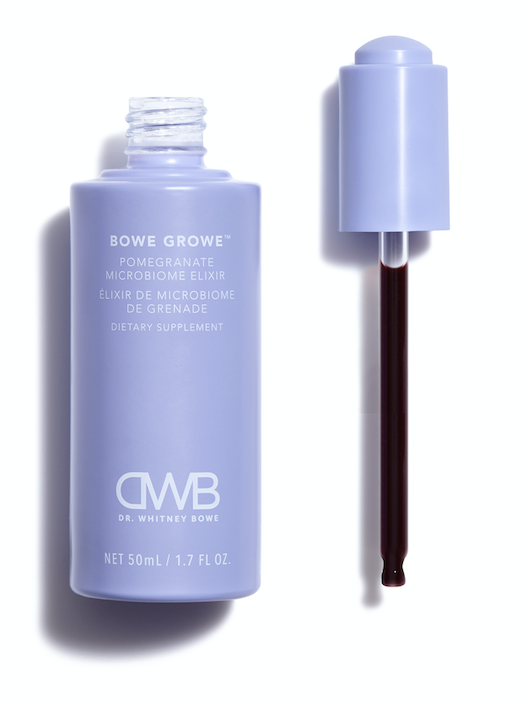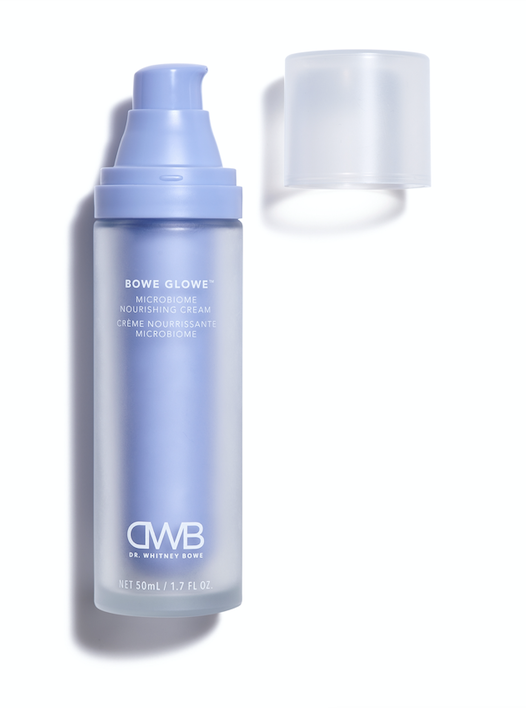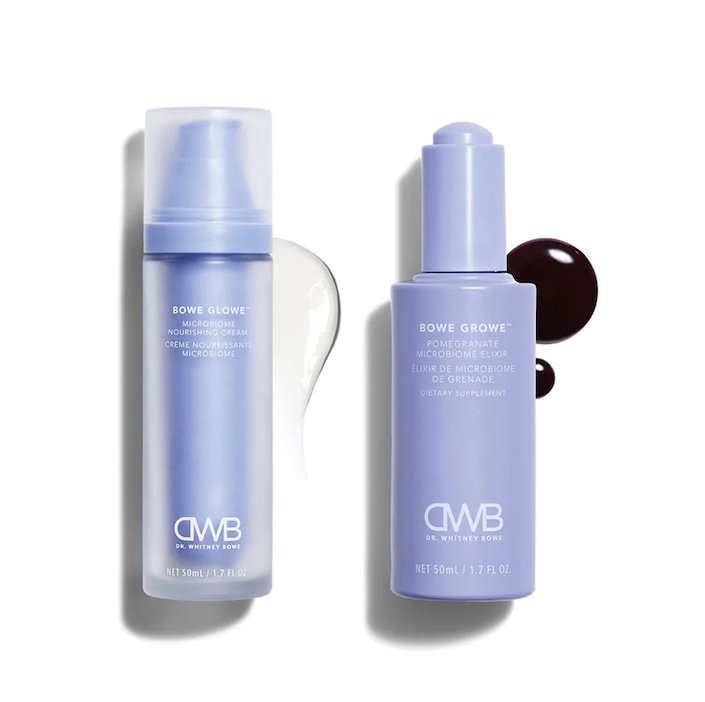Rethink Probiotics. This Form Of “Inner Skincare” Is More Effective
Photo: Courtesy of Dr. Whitney Bowe.
I don't know about you, but I've been made to believe that I should have more probiotics in my life. According to the health trends and microbiome mumbo-jumbo, I blindly assumed that mixing a packet of ginger-flavored probiotic powder in my water would probably be good for me and might make my skin brighter.
When it didn't and I felt bloated to boot, I dug a little deeper. Turns out, most dermatologists attest that probiotic skincare — both topical and supplemental — is pretty useless and any evidence to the contrary is anecdotal at best.
You can stop reading there, but the current science and conversation adds nuance. Because dermatologist and Yale-trained research scientist Dr. Whitney Bowe holds that there is a founded gut-skin connection — we understand skincare is holistic — but you don't need probiotics. For skin health, new research shows that 'smart' prebiotics and postbiotics are more effective.
AdvertisementADVERTISEMENT
In her new namesake skin-care line, Dr. Whitney Bowe Beauty, Dr. Bowe is educating on a two-pronged concept she coins "inner and outer skincare" — which is one part supplemental (Bowe Growe, a pomegranate elixir that you mix with water) and one part topical (Bowe Glowe, a moisturizer that feels like a La Mer Soft Cream, but with microbiome research behind it). While we're generally sus on 'beauty' supplements, Dr. Bowe welcomes healthy skepticism and explains why her research is founded on the newest microbiome research which shows actual skin-care results over and above consumer-perception studies or anecdotes.
On the gut-skin connection
Our understanding of the gut-skin connection focuses on the microbiome, the bacteria both in our gut and on our skin. "Beautiful science coming out of the Human Microbiome Project is showing that when you rebalance the gut microbiome, that can support skin health," Dr. Bowe explains. She has a TikTok video where she breaks it down. "When your microbiome balance is off in the gut and you have something called dysbiosis, it actually leads to intestinal permeability, the gut lining becomes leaky. So, inflammatory molecules that are suppose to be housed within the gut are now able to penetrate into systemic circulation, and that can actually trigger inflammation in the skin — it can show up as accelerated aging, flares of acne, rosacea, psoriasis, eczema. When you rebalance the microbiome, it can have profound implications for your skin health as well."
AdvertisementADVERTISEMENT
@drwhitneybowe Have you noticed a link between what you eat or drink and your skin? Share below! #thatboweglow #skincare #dermatologist #guthealth #gutskinconnection ♬ Running Up That Hill (A Deal With God) - Kate Bush
On inner and outer skincare
So, why do we need specific inner skincare — shouldn't a healthy diet and topical skincare (as needed) be enough? Dr. Bowe says, yes, but implementing the inner skincare might help you reach your optimal skin health. "If you're applying products directly on the skin — which I think is valuable and a critical part of quality skincare — you could be using the most effective products in the most strategic and thoughtful way possible, and it's inevitable that you're still going to hit a plateau in terms of the results that you see in your skin," she says. "In order to really drive those results and truly optimize skin health and break through that plateau, you need to approach the skin in a three dimensional manner. You need to treat the skin from the inside out and from the outside in."
On "smart" prebiotics
Admittedly, I don't really understand 'biotics (pre, pro, and post), but what's important to know is that you can't take something for gut health and assume it's beneficial for the skin. (Of course, I say this in hindsight.) The gut microbiome and the skin microbiome are "vastly different," Dr. Bowe explains. So, in her clinical research, Dr. Bowe formulated both her inner and outer skin-care around specific prebiotics: "I looked for 'selective' or 'smart' prebiotics that have been shown to encourage the growth of beneficial strains [of bacteria] while inhibiting the growth of less desirable strains," she explains, "they're very targeted in their effects."
AdvertisementADVERTISEMENT
These 'smart' prebiotics are present in both the moisturizer (outer skincare) and the elixir (inner skincare). The moisturizer has the prebiotic, postbiotics, squalane, ceramides, and hyaluronic acid. Dr. Bowe recommends using it twice a day, both morning and night.
On the power of pomegranate
With the elixir, you keep it in the fridge, shake it, and add 1-3 dropper fulls of water — it ends up turning your water the color of Snapple Kiwi Strawberry. It tastes like pomegranate, which as an antioxidant, is also its skin-care benefit. "What's very interesting is that one of the key ingredients in the elixir, the pomegranate extract, there are two different clinical studies showing that it can actually have UV-protective effects and can act as a booster to your sunscreen," Dr. Bowe tells me. "The other clinical study showed that it can help with melasma and hyperpigmentation." Eat more pomegranate, folks.
The clinical data
So, what's happening to the skin when we use inner and outer skincare formulated with these 'smart' prebiotics? "When you combine the two products together and are consistent over thirty days, we did something called Next Generation Sequencing Technology — which is the gold standard for assessing the impact that products have on the skin's microbiome — and we were able to show that it actually increased skin diversity and affected the balance of key strains on the skin," Dr. Bowe explains. "So we're able to show that it does actually change the skin microbiome."
AdvertisementADVERTISEMENT
The change in the microbiome effectively decreases the aforementioned inflammatory skin concerns. "We were also able to quantify, using very sophisticated digital photography analysis to measure changes in the skin, that there was a statistically significant improvement in texture, fine lines and wrinkles, and it evened out skin tone. Those are the types of results you'd expect from like a prescription-strength retin-A."
Shop the Dr. Whitney Bowe Beauty products, separately or bundled together, below:
On the potential for future microbiome research
According to Dr. Bowe, this new science on inner and outer skincare and the microbiome has potential implications for what we'll see in the future. "Now I'm working with my peer who have PhDs in molecular genetics and we're talking about what it is that's causing these results, and we're tracking different strains of species on the skin and they can actually inhibit melanin production — so those species might be to credit for the lightening of dark spots," she says. "What I'm very excited about is that we'e moving this field forward and contributing to data that's out there. It's not just about selling products, but educating ourselves and dermatologists and educating the world about what's possible when it comes to the skin microbiome."
For more on the science behind inner and outer skincare, listen to the full interview with Dr. Whitney Bowe on Gloss Angeles:
AdvertisementADVERTISEMENT









